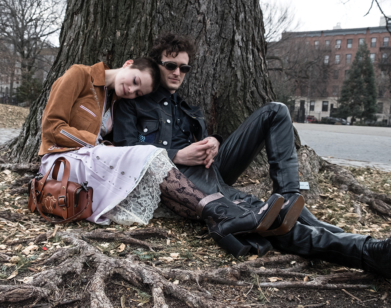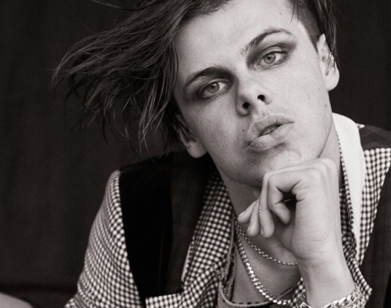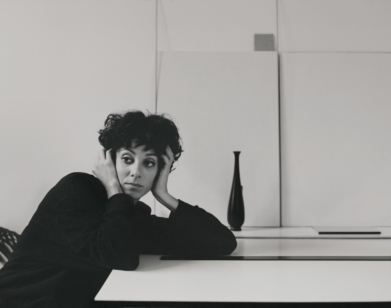The Walking Dead’s Lauren Cohan is set on survival
It’s war on The Walking Dead. And if we’ve learned anything over the show’s seven seasons, casualties will mount and, quite literally, everything’s at stake when the AMC drama returns for its 100th episode and season eight premiere this Sunday. In a post-apocalyptic, brutal world full of walkers, opposing groups fight for survival, control, independence, and, depending on whom you ask, “the greater good.” Some existential questions ensue: What does it take to endure? And what will be sacrificed along the way?
According to Lauren Cohan, the British-American actress who’s played Maggie Greene since the second season, the key to her character’s perseverance is simple: heart. “Heart as in spirit,” explains Cohan. “The ability to communicate and to inspire people to fight, inspire people to love, inspire people be vulnerable even when you’ve been hurt or bashed or crushed … She’s able to let people in even when she’s completely emotionally destroyed.”
Maggie has experienced more than her fair share of loss: an incomplete list of departed loved ones includes her father Hershel (Scott Wilson) and sister Beth (Emily Kinney); her husband Glenn (Steven Yeun), who met his end at the hands of Negan (Jeffrey Dean Morgan), leaving Maggie alone while pregnant with their child; and, most recently, her friend Sasha (Sonequa Martin-Green), who closed season seven with an act of self-sacrifice, swallowing a poison pill in defiance of Negan. Despite it all, Maggie remains a leader and beacon of resolve.
HALEY WEISS: I read about the death dinners you have when cast are killed off of the show, and that you were responsible for bringing a karaoke machine into the picture when Steven Yeun and Michael Cudlitz left. Is that true?
LAUREN COHAN: You know what, it was Danai [Gurira]’s idea; I just made the phone call. We always have these death dinners, and we’ve obviously had so many people leave now. We still have the really sad part of the night where everyone sort of says their goodbyes, but Danai had this great idea to liven it up for the second part. We finished the night singing Backstreet Boys karaoke and everything else cheesy you can imagine. Steven was the first who we had the idea to do that for, because he really is such a karaoke king—I don’t know if he’s karaoke king, he’ll kill me if I say that—but he’s a really good singer. And he’s very sentimental, so we sang a bunch of ridiculous stuff. That night we did a tribute; we started it off with Backstreet Boys, and we all dressed as the Backstreet Boys [combined] with [Cudlitz’s character] Abraham—we had all white on and ginger mustaches. Everybody was sitting and eating barbecue, and all the girls filed out and did this dedication to Steven. It was really good. We cried and laughed.
WEISS: Was there choreography involved?
COHAN: Oh, yeah. I mean, I don’t know if I’d call it choreography, but there were movements set to a timetable. [laughs] There was definite dedication; there was commitment to it.
WEISS: What was the season seven death dinner like for Sonequa Martin-Green leaving?
COHAN: We had a huge celebration for Sonequa for her baby shower; there have been a lot of babies on the show too. And for Sonequa’s death dinner—we are so cheesy, it’s embarrassing to put this in print—we each wrote a poem for Sonequa, not each of us, this is our little girl party, we do these things every time. And we recited our poems to Sonequa about Sonequa. [laughs] It was actually really beautiful. Wink murder, that’s Sonequa and her husband’s favorite game, so we actually played that. We had a long night; we were there till really late on Sonequa’s night. We always do something for the person; sometimes we’ll have a fire pit and we’ll go to one of our producer’s houses, she has a great fire pit, and we’ll sit around there. It’s like a giant family occasion with all of us.
WEISS: Because it is such a family environment, as the cast has described it, do you remember the first time you felt at home on set?
COHAN: Coming in with Scott Wilson and Emily [Kinney], we weren’t part of the original group of the show, but I felt like my own family instantly with them. And then Steven bridged the gap between us as the Greene family and the rest of the group; Steven definitely introduced himself to me before we even started. That’s the really cool thing about this show: you’ll have outreach from us before you even start working, that’s what I’ve learned since the beginning. We want to get to know each other and welcome people, and that’s definitely what happened for me when I came on. Steve was like, “Hey, welcome. Have you landed?” So we got dinner, and that was before my fittings, before any of this stuff. I had literally just gotten the show and landed in Atlanta. But honestly, I cannot believe how caring of a TV dad I had [in Wilson]. It was very easy to love him like a real parent and feel the connection that we feel in this environment and in this word. I think that we’re so lucky to be that emotionally connected, because then when we tell these stories—I mean, I really love Scott and Emily, and when they go, it’s not difficult to portray the sadness.
WEISS: How would you say the show has changed you as an actor? Do you think there are specific lessons you can take away from it?
COHAN: A thousand percent. The Walking Dead has allowed me to experience success and remain myself and develop some of the closest bonds, both professionally and personally, that I could ever have imagined. It’s taught me a lot of life lessons. It’s showed me that these things are possible. It’s bittersweet losing people all the time; I get emotional thinking about it. I don’t like that we all don’t get to come in and leave at the same time and say, “There’s this thing that we did,” and that we’re not all there to say goodbye to the experience together. But I also know that’s not life, and it’s a great microcosm for the whole experience at this point in my own life.
WEISS: The show is reaching a milestone with season eight: it’ll be 100 episodes when the season premieres. How would you characterize Maggie’s arc over that time?
COHAN: I think this season I see some of the biggest changes in her. She’s had to become hardened, not because that’s what the world requires, but … I’d say there’s been a pretty constant perseverance and optimism for Maggie, and this year she has to make really hard decisions. I don’t know if they will permanently change her, but they are definitely showing a very different side of what this world requires you to be.
WEISS: Her speech, which season seven ended on, is nice because even though she’s had to harden herself in experiencing all of these losses, she has this great perspective on how Glenn sort of set all of this in motion.
COHAN: In motion—I know, I have chills right now when you said that. That’s it. It started, and it’s not really my job [as Maggie] to decide how to do it; it’s just to keep what began in motion, that action and that inspiration. And at the core of it all is to keep the people I love alive. I’ve always felt like Maggie does acknowledge the greater purpose of it, and in some ways, hopefully, the purpose to keep going even when you lose people. Losing people means you need to go on and fight even harder, not give up. I do think that seed was set in motion right at the beginning; before anybody knew, we just kept going, soldiered on. That’s actually the biggest lesson for me: it’s keep going and doing the thing that you know is right.
WEISS: Speaking of purpose and what’s right, the war seems to be about more than survival; it’s ideological. What would you say is the central battle of this war? What are they fighting for?
COHAN: Negan is definitely fighting for power, for control, and the question that really comes this year is, do our values crossover? In pursuit of our support of life, what are we fighting for? There’s a lot that’s said to this effect, but it’s said in [season] eight. It’s about it not being for self, it’s about it being for the greater good. That’s the fundamental difference between how our groups operate, and that is going to be an interesting topic. There’s a lot of people seeking vengeance for what Negan did, and I think it comes down to the question of, am I doing this for me, or am I doing this for the greater good? And within that, even when we experience loss, how do I still make a decision that benefits the whole, and not just feed my false sense of leadership or control or satisfaction? Satisfaction is a big thing. That’s what’s interesting for Maggie, and she says that to Daryl last year: “I want to string them all up and watch them die, but we have to win,” and not just win this fight, but put ourselves to bed at night. I’m the only one that puts my head on the pillow, and is this a life worth living, even if only I know that this isn’t right, the way that I’m doing this? But then, how much does trauma deteriorate your ability to act from that place? How much can you really take before you just freak the hell out, basically, and become the thing that you’re afraid of or trying to avoid?
SEASON EIGHT OF THE WALKING DEAD AIRS ON AMC SUNDAY, OCTOBER 22, 2017.





